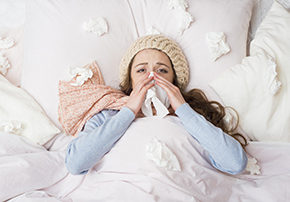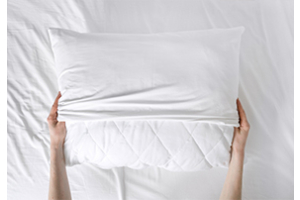Sleep Well to Beat the Flu

Sleep Better, Stay Stronger. Keep The Flu Away This Winter.
It’s not something to be sneezed at. Deep, quality sleep every night is essential for maintaining a strong and healthy immune system. And if you’re unlucky enough to catch a bug, your best quality sleep becomes even more essential. A Sleep-For-Life approach is what’s needed. Let’s see how best to integrate your sleep into a healthier lifestyle.
Sleeping to Prevent the Flu.
The inner workings of the human body are fascinating. If someone coughs in the lift, if you unwittingly use a co-worker’s keyboard, if your child comes home with the sniffles – your body immediately detects an “alien invasion”. Prevention is always better than cure. If there’s anything we’ve learned from those dreaded Corona days, it’s that clean hands help contain potential infections. Let’s not forget that.
Regardless, if we maintain a strong and healthy immune system, we have an inner core defence against the flu.
Here’s how sleep keeps the immune system fighting fit.
Following a healthy diet, getting moderate exercise, keeping routine sleeping hours – it all helps to keep you healthy. But it’s especially when you sleep that the benefits are truly realised. Any potential infections that might develop are processed during deep stages of sleep. Toxins are efficiently processed and cycled out of the system. It’s basically a whole action-drama happening inside your own body as your antibodies go to war with the “evil pathogens” that can cause viruses and bacteria. Getting deep, quality rest every night allows your body to gather the “immunity brigade” and fight off the threat.
Sleeping to Recover From the Flu.
When you’re ill you’ll likely feel depleted, lacklustre and generally out of sorts. That’s when your immune system kicks into overdrive. And you need to afford it all the support it requires in the battle against infection.
Sleep is definitively one of the most important components of recovery. It seems odd to think of “fighting back” as lying down and resting. But that’s precisely what your body needs to recuperate. Proper rest allows the immune system to regather and get you back to your peak health.
Managing your flu symptoms will also assist with better quality sleep. Unblocking your sinuses and alleviating a cough will allow you to sleep with less interruption. Take extra care to optimise your sleeping environment. Ensure you keep a gentle flow of fresh air through the bedroom, even during cold evenings. Be mindful not to pile on the blankets and turn up the heating system. Your body operates best at its own core temperature.
Take a Healthy Attitude to Sleep.
Like anti-flu precautions such as keeping your hands sanitised, sleep hygiene is also just as important. Sleep hygiene is about a daily routine that takes care of all the things that help to afford you a restorative night’s rest. Be mindful of when and what you eat during the day, especially approaching bedtime. Make time during the day for moderate exercise. Get out into natural sunlight. This helps to produce sleep-inducing melatonin at night.
Basically, if you put your sleep hygiene front and centre of every day, you’ll likely slip with ease into every next slumber. Focus everything towards the quality of your sleep and you may be astounded just how productive and rewarding each day can be.
Enjoy Your Healthiest Sleep With Dial•a•bed.
A trip to Dial•a•Bed is just what the doctor ordered. Finding precisely your level of comfort and support in a mattress is the very foundation of your perfect sleep. If sleep is the underlying activity (nope, no pun intended) that keeps you at your healthiest best, then you really do not want to compromise on the quality design and construction of your bed.
Just a few minutes at www.dialabed.co.za will quickly inform you of just how vast our sleeping preferences can be. And Dial•a•Bed has it all covered, bar none. Perhaps the approaching winter months are a good time to consider a mattress upgrade. And keep the sniffles at bay. Stay wise and well. # SleepForLife.
TAKE CARE: Lifestyle recommendations are not medical advice. Always consult your healthcare professional should you be experiencing prolonged sleep difficulties or related health issues.





